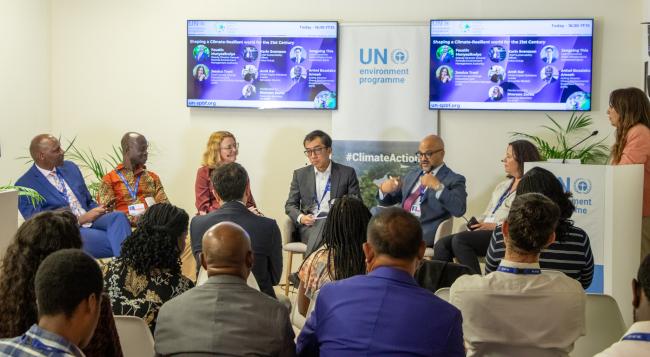Tuesday, July 1, 2025
At the World Climate Action Summit in Dubai, United Arab Emirates, COP28 is underway and major global announcements are rolling out. At the 28th Conference of the Parties (COP28) to the United Nations Framework Convention on Climate Change (UNFCCC) more than 120 leaders signed the UAE Declaration on Climate and Health.
The political phase of the Global Stocktake (GST) featured discussions on mitigation and support to developing countries. Elsewhere, GST talks focused on adaptation and discussions on carbon markets showed some progress.
In line with Health and Relief, Recovery and Peace Day at COP28, Steven Guilbeault, Minister of Environment and Climate Change, highlighted Canada’s international adaptation finance by investing in locally led and gender-balanced adaptation initiatives.
Guilbeault announced an international climate finance commitment of $5 million over three years to the Least Developed Countries Initiative for Effective Adaptation and Resilience (LIFE-AR). This project aims to help least developed countries be on climate-resilient pathways by 2030.

The UNEP Adaptation Gap Report 2023 has emphasized a decline in multilateral and bilateral adaptation financial flows with massive implications for adaptation, as well as for responding to loss and damage from climate change, particularly for the most vulnerable. This session, convened by the UN Science-Policy-Business Forum (UN-SPBF) at the UN Environment Programme (UNEP) pavilion, brought together key industry, finance, and developing country representatives to provide insights into the role of industry and private sector investment to finance progress and drive the adaptation agenda in achieving environmental goals. (Image credit: IISD/ENB / Matthew TenBruggencate)
Through the LIFE-AR initiative, least developed countries work with hundreds of experts from around the world to learn from, and build on, existing good practices. This initiative empowers least developed countries to build climate resilience, reduce their vulnerability, and showcase innovation. It is one example of how governments and civil society can work together to deliver real results for those most in need.
“Least Developed Countries have been on the frontlines of efforts to keeping 1.5C within reach and addressing loss and damage. They remind us of the urgency of the triple crises of climate change, pollution, and biodiversity loss require urgent cooperation. For me, this announcement is about partnerships to advance transformational adaptation and sustainable development practices,” said Guilbeault. “COP28 is an opportunity for countries to come together as a global community to plan for a more climate-resilient future. Today’s announcement means more support for those that need it the most.”
In 2021, Canada doubled its own international climate finance commitment to $5.3 billion over five years (2021–2026). This commitment increases the provision of funding toward adaptation to 40 percent, more than double Canada’s previous support.
At home, the Government of Canada is working with provinces, territories, Indigenous peoples, and other key partners and experts to implement the recently released National Adaptation Strategy. The Strategy, the first of its kind, lays out a framework to improve health outcomes, reduce the risk of climate-related disasters, protect nature and biodiversity, build and maintain resilient infrastructure, and support a strong economy and workers.
To support this, the Government of Canada Adaptation Action Plan, released alongside Canada’s National Adaptation Strategy, outlines federal action on climate change adaptation. With over 70 actions, the Action Plan outlines the federal contribution to achieving Canada’s climate change adaptation goals.
The environment, and the many people and communities affected, simply cannot wait. Meaningful commitments are needed now to continue our support for innovative climate adaptation initiatives in Canada and abroad.
In Canada, insured losses for catastrophic weather events have tripled to more than $18 billion in the last three decades. Every dollar spent on adaptation measures saves up to $13 to $15, including direct and indirect economy-wide benefits.
Canada joins the United States, Norway, Italy, the United Kingdom, Sweden, Ireland, Germany, Finland, Denmark, and Austria in the Partnership Compact for the Least Developed Countries (LDC) 2050 Vision, in support of the LDC Initiative for Effective Adaptation and Resilience (LIFE-AR).
Despite this major announcement on the first day of the summit, there is still skepticism about the potential of this event. It is the second UN climate conference in a row to be hosted by an oil- and gas-producing nation with the inclusion of fossil fuel company representatives.
Julia Levin, associate director of National Climate with Environmental Defence Canada states:
“We are pleased that Canada was one of the first countries at COP28 to contribute funds for loss and damage. Yet the amount committed is a very small fraction of what the government spends subsidizing oil and gas companies. So far this year, Canada has provided over $10 billion to the companies fueling the climate crisis – and causing loss and damage in the first place.”
Featured image credit: IISD/ENB / Mike Muzurakis











